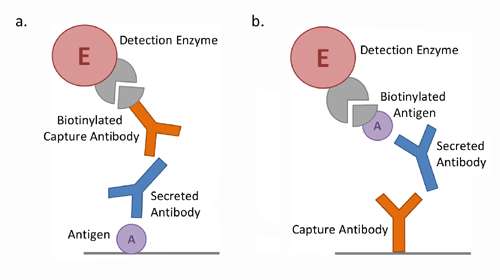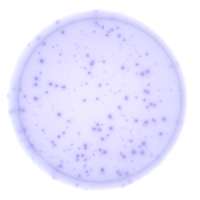Your basket is currently empty!
B cell ELISPOT Assay Service
ProSpot® B Cell ELISpot Assays
analyse antibody responses at source
Analysis of B cell responses at a cellular level
The B cell ELISpot assay allows you to investigate the presence of antibody-secreting memory B cells in your samples. The technique can be used to detect B cell responses in all settings including responses to vaccination, infection, drug treatments or in immune-compromised or autoimmune patients.
Why use B cell ELISpot?
B cell ELISpot complements other methods commonly used to monitor a memory B cell antibody response, with the added advantage of the response being characterized in detail at the cellular level. Serum ELISA (or for larger numbers of antigens and sera, protein array analysis) is a useful and straightforward way to measure serum antibody titers, but the assay gives no indication of how many cells are making the response. This is where B cell ELISpot is so useful. For example, the number of antibody-secreting cells (ASC) present can be correlated with the protection from disease conferred by a vaccine. The effects of disease, drug treatment and other factors on the frequency of a responsive memory B cell population can all be analysed using B cell ELISpot.
B cell ELISpot at ProImmune
ProImmune offers a B cell ELISpot service to save you the cost and effort of setting up this assay in your lab. Our team will perform the experiments for you, freeing up your time for core work and project planning. Using our optimized service will save you time and money, while allowing you access to our expertise, and giving you confidence that you are using the best technology. We are able to manage every aspect of your project, from design and sample shipment to reporting and helping you to interpret your dataset.
| a
|
b
|
Figure 1: B Cell ELISpot performed by ProImmune. 62,500 donor peripheral blood mononuclear cells were stimulated to activate all memory B cells, and total IgG secretion was measured by ELISpot. a: stimulated, b: unstimulated control.
B cell ELISpot method
Memory B cells require stimulation before they will secrete antibody, and this is performed in vitro in a pre-incubation step using a mixture of cofactors. This stimulation expands the cells, so it is common to compare the total number of IgG-secreting cells to the number of antigen-specific ASC to obtain an accurate estimate of the number of ASC present.

Figure 2. B Cell ELISpot Assay setup options
Antigen is coated on to a plate to provide a capture matrix. A cell suspension containing B cells is added to the plate, and incubated so that the antibody-secreting cells (ASC) can respond and produce antibody. Secreted antibody is captured on the immobilized antigen, and can be detected using a biotinylated secondary antibody and a streptavidin-conjugated enzyme (a). A spot-forming substrate is added to the plates, and spots are formed in the location of each ASC. These spots can be counted to estimate the frequency of antigen-specific memory B cells in the cell preparation.
Alternatively, the secondary antibody may be immobilized on the plate, and used to capture antibody secreted in response to soluble, biotinylated antigen (b). The same streptavidin-conjugated enzyme and substrate are again used to leave spots in the location of each ASC.
To detect rare responses, it is possible to extend the pre-incubation period by a few days, or to enrich the test cell population by isolating CD19-expressing cells.
Troubleshooting B cell ELISpot
B cell ELISpot is not an easy experiment to perform, as many different steps need to be optimized before dense, well-defined spots are obtained.
Care needs to be taken with the following:
-
Cell Handling
-
Cell preparation should be performed by experienced personnel
-
Reagents should be pre-qualified to ensure consistent performance
-
Culture time should be optimized
-
-
Assay Setup and Spot Detection
-
Experience is required to determine the best layering setup for antibody capture.
-
If plate-bound antigen is used, well defined spots are obtained if antigen is coated at a high density, but the epitopes still need to be accessible to secreted antibody.
-
If immobilized secondary antibody is used, it is important to get the ratio of bound to secreted antibody correct.
-
-
Equipment and Software
-
Set up and validation of the detection equipment and software is important to ensure consistency of assay results.
-
Working with ProImmune
ProImmune has many years of experience in providing cell mediated immunity assays as a service, including T cell ELISpot and cell proliferation assays. Our new B cell ELISpot analysis service can also be seamlessly integrated in a broader assay program, if required. All of our customer service team are Ph.D immunologists and able to plan your experiments with you. We aim to provide a hassle-free service, and results for you in a matter of weeks.
How are other researchers using B cell ELISpot?
There are many examples of B cell ELISpot being invaluable in cancer research, research into infectious and childhood disease, work on autoimmunity and allergic conditions, and in Biodefense and GI disease.


